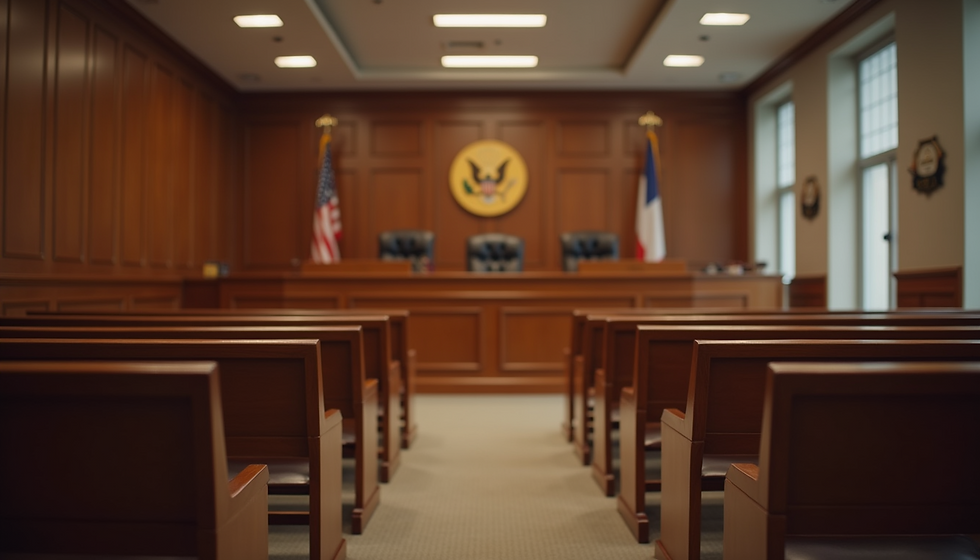Former Deputy Ryan Kuehner of St. Charles County Sheriff's Department Gives His Perspective on Police Brutality
- ryankuehner
- Apr 16, 2025
- 4 min read
In recent years, police brutality has emerged as a critical issue that affects many lives. The discussions can be uncomfortable, yet they are necessary for meaningful change. One significant voice in this conversation is former Deputy Ryan Kuehner. His unique perspective, shaped by years of serving in law enforcement, offers valuable insights into the challenges of policing and the vital need for accountability.
This blog post aims to explore Kuehner's thoughts on police brutality, drawing on his experiences and insights to encourage a deeper understanding of the relationship between law enforcement and the communities they serve.
Understanding Police Brutality
Police brutality often refers to excessive force by law enforcement officers, both physically and psychologically. This kind of behavior can seriously damage public trust, creating a divide between communities and their police departments. In fact, studies show that 63% of Americans believe that police are more likely to use excessive force against minorities, highlighting the urgent need for change.
Kuehner emphasizes the importance of examining police conduct from multiple angles, acknowledging the often-overlooked realities that officers face. For many police officers, daily duties involve navigating complex situations where the line between necessary force and excessive force can become unclear.
Kuehner's Experiences in Law Enforcement
During his years as a deputy, Kuehner faced significant challenges while balancing law enforcement duties with ethical responsibilities. He encountered both commendable efforts and regrettable misconduct in policing.
For instance, he recalls an incident where an officer used force during a high-speed chase that ended in a violent arrest. Kuehner explains how the officer believed he was acting in the community's best interest but later regretted his actions. This example illustrates the immense pressure officers face, especially in high-stress environments. Such moments call for empathy, understanding, and a nuanced view of police conduct.
The Human Element in Policing
Kuehner emphasizes the human factor in policing. Officers are not merely enforcers of the law; they interact with people in their communities daily. This interaction can build trust or breed distrust.
When officers work with empathy, they are less likely to resort to excessive force. Kuehner advocates for training focused on emotional intelligence and de-escalation strategies. For example, implementing scenario-based training, where officers practice responding to crisis situations without using force, can create safer outcomes for everyone involved.
Impact of Community Relations
Kuehner's insights raise crucial points about the importance of police-community relations. Effective communication and community engagement can dramatically improve perceptions of law enforcement. Research shows that programs centered on community policing have led to a 20% reduction in crime rates in some cities, proving the value of collaboration between officers and residents.
Kuehner believes that establishing strong relationships serves a dual purpose: it enhances policing practices and reduces fear of brutality among community members.
The Role of Accountability
Accountability is vital when discussing police brutality. Kuehner insists that for reforms to be successful, a robust system must be in place to hold officers accountable for their actions. This includes ensuring transparency during investigations of misconduct and consequences for officers guilty of excessive force.
In recent years, growing movements advocating for police reforms, such as the push for body cameras, have garnered support. Kuehner fully backs these initiatives, recognizing their potential to rebuild public trust.
Training and Reform
Kuehner also highlights the need for comprehensive training programs to combat police brutality. He argues that many departments currently fall short in preparing officers for the challenges they will face on the job, particularly regarding emotional intelligence and conflict resolution.
Kuehner suggests reforms that focus not only on tactical skills but also on communication strategies and mental health support. For example, a study of departments that adopted enhanced training found a 30% decrease in use-of-force incidents within two years, demonstrating the potential benefits of such reforms.
The Media's Role
The media significantly shapes public views on police brutality. Kuehner points out that while journalism can expose injustices, it sometimes presents a one-sided narrative that overlooks the intricate realities of policing.
He calls for responsible reporting that contextualizes incidents of police misconduct within broader issues, such as systemic challenges in law enforcement. Balanced coverage can help mitigate misconceptions and promote more informed discussions.
The Future of Policing
As society continues to confront police brutality realities, the future of policing will hinge on integrating lessons learned from figures like Ryan Kuehner. His insights serve as a reminder that change must come from within law enforcement, focusing on training, accountability, and community engagement.
Kuehner believes that with the right reforms, policing can transition into a community-focused approach that prioritizes safety for officers and citizens alike. Ultimately, the goal should be building relationships founded on trust, respect, and understanding.

Final Thoughts
Former Deputy Ryan Kuehner's perspective on police brutality shines a light on the complexities of law enforcement. His insights advocate a balanced approach that considers the challenges officers face while also pushing for essential reforms focused on accountability and empathy.
A robust dialogue among current and former law enforcement officials, community members, and policymakers is crucial as we work towards meaningful change. Kuehner's experiences remind us that behind the badge are individuals facing real-world challenges. Addressing these challenges through training, community involvement, and accountability may be key to reducing police brutality and restoring trust in our law enforcement agencies.



